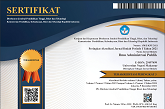Improving Public Service Quality through the Development of Online Service Innovations in Public Sector Organizations in Indonesia
(1) Political Science Program, International Women University, Indonesia
(*) Corresponding Author
DOI: https://doi.org/10.26858/jiap.v13i1.45170
Abstract
This research aims to explore the potential of online service innovations in the public sector in Indonesia to improve the quality of public services. The study employs a mixed-methods approach, including surveys, interviews, and case studies, to gather data from various public sector organizations in Indonesia. The results indicate that the development of online service innovations has the potential to improve the quality of public services, particularly in terms of accessibility, efficiency, and effectiveness. The study also identifies several challenges in implementing online service innovations, including technical issues, limited resources, and resistance to change. The findings suggest that public sector organizations in Indonesia should prioritize the development of online service innovations as part of their efforts to improve the quality of public services. This research provides valuable insights for policymakers and practitioners who are interested in enhancing public service delivery through the use of technology.
Keywords
Full Text:
PDFReferences
Admin, A. (2022). The Effect of Organizational Justice and Service Quality on Customer Perceived Value among University Students: Controlling the Effect of Demographic Variables (Age, Gender, Social-Economic Status, and GPA). International Journal of Educational Administration, Management, and Leadership, 3(1), 27–32. https://doi.org/10.51629/ijeamal.v3i1.87
Akman, I., Yazici, A., Mishra, A., & Arifoglu, A. (2005). E-Government: A global view and an empirical evaluation of some attributes of citizens. Government Information Quarterly, 22(2), 239–257.
Arayankalam, J., Khan, A., & Krishnan, S. (2020). How to deal with corruption? Examining the roles of e-government maturity, government administrative effectiveness, and virtual social networks diffusion. International Journal of Information Management, 102203. https://doi.org/https://doi.org/10.1016/j.ijinfomgt.2020.102203
Brown, K. (2004). Human resource management in the public sector. Public Management Review, 6(3), 303–309. https://doi.org/10.1080/1471903042000256501
Cahyaningsih, E., Sensuse, D. I., & Sari, W. P. (2016). Critical success factor of knowledge management implementation in government human capital management: A mixed method. 2015 International Conference on Information Technology Systems and Innovation, ICITSI 2015 - Proceedings. https://doi.org/10.1109/ICITSI.2015.7437718
Chong, M. C., Francis, K., Cooper, S., Abdullah, K. L., Hmwe, N. T. T., & Sohod, S. (2016). Access to, interest in and attitude toward e-learning for continuous education among Malaysian nurses. Nurse Education Today, 36, 370–374. https://doi.org/https://doi.org/10.1016/j.nedt.2015.09.011
Çınar, F., & Eren, E. (2015). Organizational Learning Capacity Impact on Sustainable Innovation: The Case of Public Hospitals. Procedia - Social and Behavioral Sciences, 181, 251–260. https://doi.org/https://doi.org/10.1016/j.sbspro.2015.04.886
Creswell, J. W., & Creswell, J. D. (2017). Research design: Qualitative, quantitative, and mixed methods approaches. Sage publications.
Crosby, D. H. (2015). Improving Employee Retention in the Public Sector by Increasing Employee Engagement. SSRN Electronic Journal. https://doi.org/10.2139/ssrn.2555709
Elnaghi, M., Alshawi, S. N., Kamal, M. M., Weerakkody, V., & Irani, Z. (2019). Exploring the role of a government authority in managing transformation in service re-engineering – Experiences from Dubai police. Government Information Quarterly, 36(2), 196–207. https://doi.org/https://doi.org/10.1016/j.giq.2018.11.011
Feroz, A., Jabeen, R., & Saleem, S. (2020). Using mobile phones to improve community health workers performance in low-and-middle-income countries. BMC Public Health, 20(1), 49. https://doi.org/10.1186/s12889-020-8173-3
Hassett, M. P. (2022). The Effect of Access to Training and Development Opportunities, on Rates of Work Engagement, Within the U.S. Federal Workforce. Public Personnel Management, 51(3), 380–404. https://doi.org/10.1177/00910260221098189
Maulana, R. Y., Bafadhal, F., & Firmansyah, A. (2019). E-Government Implementation: The Concept of Innovative Transformation of Leadership and Public Officials’ Capacities in Indonesian Open Government (The Case of Evaluating E-Government Utilization in Government Information Management in Jambi Province). Available at SSRN 3497307.
Pan, S.-L., Tan, C.-W., & Lim, E. T. K. (2006). Customer relationship management (CRM) in e-government: a relational perspective. Decision Support Systems, 42(1), 237–250. https://doi.org/https://doi.org/10.1016/j.dss.2004.12.001
Prasodjo, T. (2020). Knowledge Management: Sustainable Human Resource Development in Public Sector Organizations. Jurnal Ad’ministrare, 6(2), 159–166. https://doi.org/10.26858/ja.v6i2.12466
Saputro, H. E. (2016). Kualitas Pelayanan Publik. Profesional: Jurnal Komunikasi Dan Administrasi Publik, 2(1). https://doi.org/10.37676/professional.v2i1.163
T. Rajeswari, T. R., & Dr. P. Palanichamy, D. P. P. (2012). Impact of Training and Development on Employee Performance in Select Public Sector organizations. International Journal of Scientific Research, 3(4), 1–3. https://doi.org/10.15373/22778179/apr2014/227
Tassabehji, R., Hackney, R., & Popovič, A. (2016). Emergent digital era governance: Enacting the role of the ‘institutional entrepreneur’ in transformational change. Government Information Quarterly, 33(2), 223–236. https://doi.org/https://doi.org/10.1016/j.giq.2016.04.003
Wahab, R. A., & Arsyad. (2015). Studi Implementasi E-Government di Daerah Perbatasan The Study of E-Government Implementation in Border Area. Jurnal Pekommas, 18(1), 1–14.
Ziadi, A. R., Supriyono, B., & Wijaya, A. F. (2016). The Effectiveness of Information System in Public Complaint Service: An Implementation of E-Government based on Jakarta Smart City Applications. Global Journal of Management and Business Research: A Administration and Management, 16(8), 53–57.
Article Metrics
Abstract view : 298 times | PDF view : 128 timesRefbacks
- There are currently no refbacks.
Copyright (c) 2023 Tetet Cahyati

This work is licensed under a Creative Commons Attribution 4.0 International License.
Diterbitkan oleh:
Program Studi Ilmu Administrasi Publik
Program Pascasarjana Universitas Negeri Makassar
JIAP Index By:

This work is licensed under a Creative Commons Attribution 4.0 International License.









